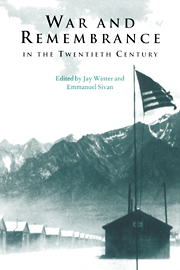Book contents
- Frontmatter
- Contents
- Preface
- Introduction
- 1 Setting the framework
- 2 Forms of kinship and remembrance in the aftermath of the Great War
- 3 War, death, and remembrance in Soviet Russia
- 4 Agents of memory: Spanish Civil War veterans and disabled soldiers
- 5 Children as war victims in postwar European cinema
- 6 From survivor to witness: voices from the Shoah
- 7 Landscapes of loss and remembrance: the case of Little Tokyo in Los Angeles
- 8 The Algerian War in French collective memory
- 9 Private pain and public remembrance in Israel
- 10 Personal narratives and commemoration
- 11 Against consolation: Walter Benjamin and the refusal to mourn
- Index
- Studies in the Social and Cultural History of Modern Warfare
3 - War, death, and remembrance in Soviet Russia
Published online by Cambridge University Press: 27 October 2009
- Frontmatter
- Contents
- Preface
- Introduction
- 1 Setting the framework
- 2 Forms of kinship and remembrance in the aftermath of the Great War
- 3 War, death, and remembrance in Soviet Russia
- 4 Agents of memory: Spanish Civil War veterans and disabled soldiers
- 5 Children as war victims in postwar European cinema
- 6 From survivor to witness: voices from the Shoah
- 7 Landscapes of loss and remembrance: the case of Little Tokyo in Los Angeles
- 8 The Algerian War in French collective memory
- 9 Private pain and public remembrance in Israel
- 10 Personal narratives and commemoration
- 11 Against consolation: Walter Benjamin and the refusal to mourn
- Index
- Studies in the Social and Cultural History of Modern Warfare
Summary
Modern warfare is a potent generator of memories. The involvement of every citizen, the unaccustomed collectivities, the emergencies and shock, the loss, the private totems and shared superstitions leave indelible printsl on the imagination. Total war, whether experienced as a combatant or as a civilian, is an almost uniquely vivid story in the life of any individual. But personal memory is only a part of the social process of remembering. Indeed, it can come to appear irrelevant or even subversive to national projects of commemoration. Even in democracies, the corporate, usually national, use of images of war is only loosely linked to the reality which people remember. Conversely, too, the individuals who file past the eternal flame may well rehearse in their silence memories and stories which have little to do with the ceremonial which has provided the occasion for their presence. The state and the individual interact, their exchange mediated, in democracies, by voluntary groups such as veterans' societies, local charities, widows' and orphans' groups. The process, a contest between competing images and claims, is complex, its outcomes – the image and historical memory of the war – provisional. The war generation will die, individual memories – painful, exciting, unresolved – will be lost, but the story of the war will remain collective property, open to periodic reassessment with each change of government.
How do these observations apply in an authoritarian single-party state like the former Soviet Union?
- Type
- Chapter
- Information
- War and Remembrance in the Twentieth Century , pp. 61 - 83Publisher: Cambridge University PressPrint publication year: 1999
- 23
- Cited by



